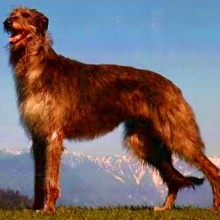Deerhound
Lifestyle Needs

The Deerhound (sometimes called the Scottish Deerhound) once hunted deer in the Scottish Highlands. He is very large, but not bulky in size. He is usually dignified, affectionate and loyal but his sheer size makes him unsuited for a family pet unless his house and garden can easily accommodate him. He should live close to open countryside and have at least two hours exercise every day, including plenty of opportunities for free running. His unkempt looking coat will need grooming regularly. The average lifespan of a Deerhound is 8-9 years.
Genetic Diversity
(Known as Coefficient of Inbreeding: 'COI'. It should be as low as possible.)
The UK Kennel Club breed average COI is 12.7 - See 'A Beginners Guide to COI'
Gene Pool Size
(Known as Effective Population Size: 'EPS')
60
EPS is a measure of how many individuals are contributing genetically to a breed population. It is a measure of the size of the gene pool in a breed. Lower than 100 is considered critical by conservationists and below 50 brings a breed close to extinction. For more information see the Kennel Club article.
Health and Welfare Problems due to Conformation
(Body shape and physical characteristics)
- Gastic dilatation volvulus (GDV) (Bloat/Torsion)
- The sheer size of a Deerhound today is unnatural for a dog and contributes to his short lifespan
BVA/KC Health Schemes: www.bva.co.uk/chs
- Hip Dysplasia
- Elbow Dysplasia
- Eye Disease
Estimated Breeding Values (EBVs) : No EBVs are currently available for this breed
www.thekennelclub.org.uk/about-ebvs
DNA Tests Available
DogWellNet and IPFD Harmonisation of Genetic Testing for Dogs (HGTD)
www.dogwellnet.com/breeds
- Factor V11 deficiency
Availability of a DNA test does not mean that it is always necessary or even desirable for breeders to use this test.
Other Breed-Specific Health Screening Schemes
- Litters to be screened for Liver shunt prior to being sold.
Ask the breeder to show you the certificates for the above tests/screening for both parents. If any of the above tests have not been considered necessary by the breeder (and there may be good reasons), ask her to explain why.
Other Diseases Reported
(For which there are currently no genetic or screening tests for sire or dam)
- Heart disease: Dilated Cardiomyopathy (DCM)
- Congenital portosystemic shunt
- Cancer – Osteosarcoma
- Neck pain (due to long neck)
- Delayed Post-operative Haemorrhage (DEPOH)
Ask the breeder about the medical history of the parents, grandparents and great grandparents. Consider carefully whether to purchase a puppy if some of these or other diseases are in the family line.
Ask about the breeder’s policy in cases of serious genetic diseases occurring to your puppy in later life. Good breeders will request to be informed of such events in order to improve future breeding decisions.
You are strongly advised to buy from a breeder who uses (or is prepared to use) the AWF Puppy Contract and Puppy Information Pack (PIP): www.puppycontract.org.uk
The breeder should also be familiar with the CFSG/DBRG Code of Practice for Dog Breeding